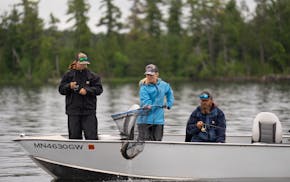Thinking about going fishing this weekend, or puttering around a lake in a pontoon on an evening cruise?
Nikki Cleveland and Colleen Audas — and perhaps thousands of other Minnesota lakeshore and river residents — ask you to think again and instead leave your boat docked or on its trailer.
Audas and Cleveland live on Prior Lake, and together with a couple of neighbors, they've filled more than 1,200 sandbags to protect their homes and property.
Their dike is reinforced every 10 feet or so with steel beams pounded into the ground, and so far it's holding. Cleveland has water in her basement crawl space. But their homes remain mostly dry.
Rains predicted for this weekend could change that. So could inconsiderate boaters on Prior Lake, who despite motoring at relatively glacial speeds on recent days have created ripple-like wakes, each one of which has the potential to chip away at the berm built by Audas, Cleveland, et al.
"Some people come by in boats just to gawk at our predicament,'' Audas said. "We ask them to kindly move on, and most do. But I can't understand why people feel the need to be on lakes when the water is so high and so many people are threatened by it.''
Audas makes a good point.
Absent a compelling reason — fishing isn't one, nor is sightseeing — boat owners should remain dockside until the state's record-setting high water subsides.
Too much to ask?
Not if you're a lakeshore owner with a dock or a boat lift that's under water, and you're worried it might wash away.
And not if the foundation of your home is threatened.
Such is the predicament of many lakeshore owners around the state, from Kandiyohi County in the west-central, where all lakes are subject to a no-wake rule, to the Rainy River, bordering Ontario.
Some boaters argue that lakeshore owners are sufficiently protected by no-wake rules, and that motorboating at minimal speeds will do no harm.
But look at the many homes on the St. Croix that are inundated with water, and the many docks and even rock jetties as far north as Crane Lake on the Canadian border that have been entirely washed away, and you'll come to the same conclusion I have:
Motorboats should be prohibited on threatened lakes and rivers until the high water recedes.
But keeping boats entirely off the state's waters isn't possible, said Kara Owens, Minnesota Department of Natural Resources boat and water safety specialist.
"DNR officers can advise against boaters being on the water, but in most circumstances they can't prohibit it,'' she said.
On June 18, the DNR told local units of government statewide they could enact emergency no-wake rules on flooded lakes and rivers without advance notice or public hearings, which usually are required.
In addition to Kandiyohi, Rice and Cass counties have restricted boat wakes within their borders, either entirely on lakes and rivers or within a certain distance of shore.
Scores of other cities have passed similar restrictions.
What does "no wake'' mean?
The legal definition is "operation of a watercraft at the slowest possible speed necessary to maintain steerage, and in no case greater than five miles per hour.''
Penalty in most cases for a violation is a misdemeanor.
Of course, the cleverest among boaters will argue that "no wake'' is in the eye of the beholder, as is the minimum speed at which steerage is maintained.
Fair enough. But before pushing the envelope of what's allowed and what isn't, helmsmen and women might want to dig deeper in Minnesota's vast catalog of statutes, one of which says it's against the law "to operate a watercraft so its wash or wake endangers, harasses or interferes with any person or property.''
Meaning that under certain circumstances on flooded lakes and rivers, boaters might be held liable for damage they cause to homeowners such as Audas and Cleveland.
Equally vulnerable in times of high water are the tens of thousands of miles of erodible state shorelines that can be damaged by boaters. Stream-bank and lakeshore sloughing is costly to repair, and can be problematic for fish and other critters that depend on "natural,'' well-established shorelines for food and cover.
Nikki Cleveland hopes forecasters are wrong about the rain that's predicted for this weekend. She also hopes boaters stay off lakes until the high water is gone.
"We don't need any more pressure against our sandbags than we already have,'' she said. "We have enough problems without people adding to them.''
Dennis Anderson • danderson@startribune.com
Anderson: He paddled solo into the BWCAW and didn't come back

Anderson: In early June, Minnesota fish are begging to be caught. Won't you help?


